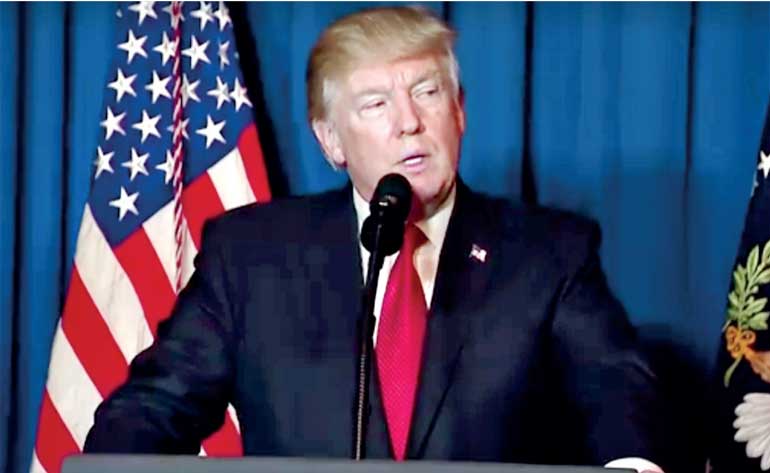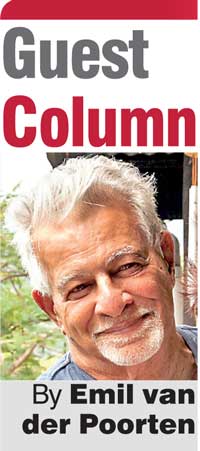Friday Feb 20, 2026
Friday Feb 20, 2026
Monday, 12 March 2018 00:00 - - {{hitsCtrl.values.hits}}

Though a Western world dominated by The Donald might be going to hell in a hand-basket, little Sri Lanka, particularly because of its dense population, cannot afford to tread the same path
With The Donald seemingly bestriding the world and the entire universe observing him with bemused wonder, it certainly is time to look around the leadership of countries – democratic and otherwise – and place them in an appropriate place in the spectrum of political policy and practice.
The very mention of the name “Putin” should be enough to invoke the vision of the leader of what is left of the Soviet Union. The man does not even pretend to follow any of the rules usually governing democratic societies and, while selectively picking off Russian oligarchs if they don’t actively contribute to the system of corruption over which he presides, runs the biggest country in the world like the Russian Mafioso he is.
In neighbouring Ukraine which has come off second best in contests, armed and otherwise, with its giant neighbour over which Mr. Putin reigns, it appears that each government is more repressive and corrupt than the one that preceded it.

France has, after a series of corrupt politicians parading as “socialists,” produced a leader who is a suave version of dictators parading as democrats in other western jurisdictions. The light at the end of that particular tunnel is the fact that, whenever France seems to be teetering on the edge of total Fascism, there has been an upsurge of indignation at the threat to traditions that grew out of its revolution being destroyed which lead to the government in power having to backpedal. One can but hope that that tradition survives.
Britain, long considered the cradle of democratic tradition and practice, has its “compromise Tory” Theresa May, with Boris Johnson, the brilliant but totally unscrupulous man who deliberately refused any suggestion that he should accept the leadership of the Tories after Brexit, lurking in the shadows and calling the shots. Scary stuff!
The Scandinavian countries, particularly over the latter part of the 20th Century, were considered bastions of humane governance where the financial bottom line was not the ultimate arbiter of what should or should not be done in a nation. However, the emergence of an increasing number of what are, euphemistically, referred to as “centre-right” governments has eroded that tradition very seriously. The warning signs have come in the form of racist and anti-immigrant groups, many displaying a capacity for extreme violence on the street.
The fact that Angela Merkel who once carried the banner for political conservatism in Western Europe is now viewed as the last best defender of humanist governance in that part of the world should say it all to anyone suffering under the illusion (delusion?) that democratic practice, as close to the ideal as possible, was alive and well in countries that were considered to adhere to such norms.
As for Southern Asia in which the countries that had emerged from the yoke of Imperial exploitation, initially, at least attempted to adopt the best of the governance system that had been practiced by their oppressors on their home turf unfortunately that story has been a sad one.
Pakistan has had a series of fiscally corrupt leaders that have followed what has unhappily become the tradition of preaching social democracy to the masses while practicing capitalism in its most abhorrent form in the management of those nations. The fact that the Bhutto family has met with sticky ends should in no way undercut this historical reality. Those who’ve succeeded them haven’t been much better and seem to survive on the basis of some form of conservative tribalism rather than as reward for good governance.
India, now probably the most populous nation on earth, has at its head a man banned – until he reached the pinnacle of power in that country – from so much as entering the USA because of his record of leading murder and mayhem on his home turf. Mark the fact that even by the standards of the USA which has a justified reputation of being tolerant of murderous tin pot dictators, particularly in South and Central America, this man was considered “untouchable” until his ascendance to power.
Myanmar, which had a rather spotty reputation in the matter of “one man, one vote” kind of democracy, has descended into a violent, anti-minority and militaristic state after a brief romance with Aung San Suu Kyi and her humanism. Even a cursory study of Myanmar’s/Burma’s post-World War II history will reveal the fact that the Nobel Laureate’s father was an army general and the fact that he was gunned down within the walls of that country’s legislature does not, in any way, alter the nature of his own politics which could be described as crypto-communist populism.
As for the Philippines and its, fortunately, unique President Duterte, what can one say more than simply point to the summary justice he dispenses in his country, claiming that those being “terminated with extreme prejudice,” as the CIA characterized that process, were all drug dealers (“with a few exceptions”). Even given the fact that the collection of thousands of islands that claims to be one country never had anything close to democratic governance, Duterte’s behaviour is not only bizarre, it is murderously so.
And now to our “home front.”
Beginning with the presidency of Sri Lanka’s Yankee Dick Jayewardene, the so-called “democratic world” has accepted leaders who have been responsible for murder and mayhem at an escalating rate, no matter how well they succeeded in concealing themselves behind nominal democratic practices.
This acceptance by those nations that had, in fact, developed democratic systems within their own boundaries was particularly reprehensible because, in the larger scheme of things, Sri Lanka didn’t have to be pandered to for strategic or other reasons.
Western intelligence could not but have been aware of the ramifications of the militarisation of governance that flowed from its armed forces being as large as the Russian army! The only explanation for that tolerance is probably the fact that those alleged “bastions of democracy” simply couldn’t be bothered with imposing the kinds of sanctions that would have been appropriate in the circumstances, with the singular exception of the removal of a preferential tariff on our garment exports.
The pious proclamations that our prosperous trading partners made from time to time appeared to be as a response to the political power of diaspora groups that owed their origins to the fact that they had fled persecution in Sri Lanka and wielded some electoral clout in their new home countries because of their numbers and militancy.
The simple fact is, though a Western world dominated by The Donald might be going to hell in a hand-basket, little Sri Lanka, particularly because of its dense population, cannot afford to tread the same path. Our inability to adopt anything resembling a confrontational stance vis-à-vis the economic giants of this world does not prevent us from putting our own house in order and conducting our affairs in a just manner, where the rule of law prevails.
The difficulty we have in establishing the “Third Force” that we desperately need to put our nation back on the rails shouldn’t deter Sri Lankans because, after all, we do have a tradition, admittedly somewhat frayed, of operating as a functioning democracy.